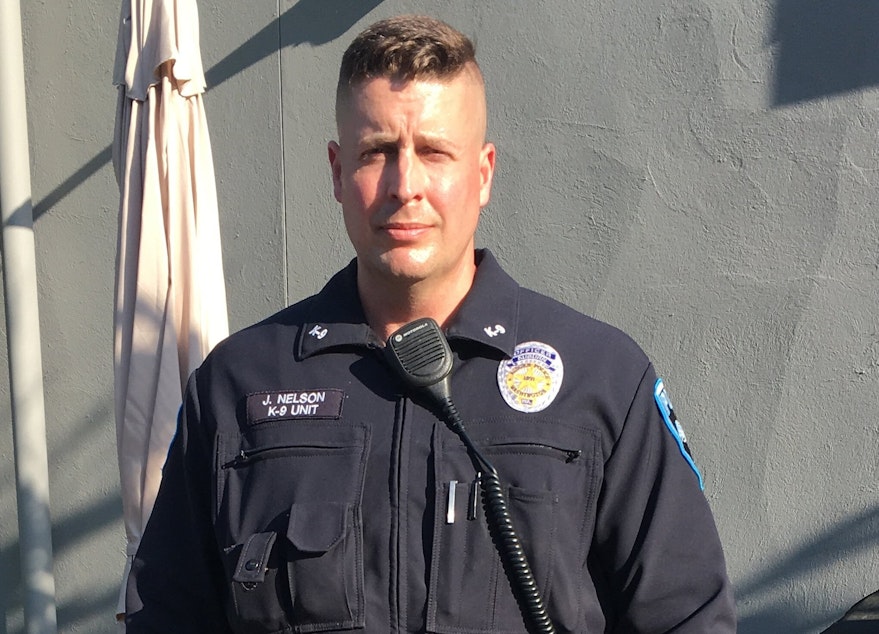Auburn police officer’s murder trial tests new state law for police misconduct

The first police officer charged with murder in Washington under a new legal standard for police misconduct is heading to trial. Jury selection is scheduled to begin April 22 in the trial of Auburn police officer Jeffrey Nelson.
In August 2020, then-King County Prosecutor Dan Satterberg charged Nelson with second-degree murder and first-degree assault for killing 26-year-old Jesse Sarey. Nelson tackled and ultimately shot Sarey while trying to arrest him for disorderly conduct.
Sarey’s former foster mother Elaine Simons said it’s been a long wait to get to this trial date.
“Not only does the Sarey family need resolution but so does Officer Nelson,” she said. “Four years is a long time for everybody.”
RELATED: The silence is maddening: remembering Jesse Sarey
Simons said for her and supporters of the Sarey family, closure would be Nelson’s criminal conviction. Nelson said in his statement about the encounter that he believed Sarey was reaching for the officer’s handgun.
Sponsored
The trial is seen as an important test of Initiative 940, approved by voters in 2018 to remove what was seen as a barrier to prosecuting police for misuse of deadly force.
The law eliminated the requirement to prove “malice” on the part of police officers. Instead prosecutors must convince jurors that deadly force was not reasonable or necessary.
King County Superior Court Judge Nicole Gaines Phelps is hearing the case at the Maleng Regional Justice Center in Kent. It’s expected to last several weeks.
Judge Gaines has already determined that the trial testimony will exclude information about Officer Nelson’s tattoos, which could be read as endorsing police violence, and his previous deadly force encounters. The court has also excluded information about Sarey’s history of drug use and public intoxication.
RELATED: Police training commission moves to decertify Auburn cop charged with murder
Sponsored
In a court filing April 16 by Nelson’s defense team, his lawyers agreed with prosecutors not to refer to their “respective funding sources” for the legal case: that King County retained the outside law firm Morgan Lewis while the defense costs are being reimbursed by the Fraternal Order of Police.
The legal teams are also negotiating their courtroom discussions of the politics surrounding the case.
Prosecutors want to ask potential jurors whether they agree with this statement: “In deciding whether to file charges, prosecutors give in too easily to public pressure.”
The defense responded that it’s reasonable to ask jurors “their opinions regarding how the criminal justice system responds to officer-involved shootings.” Therefore the defense team said, it objected “to limitations on its ability to explore potential juror bias surrounding decisions to charge police officers with murder for shootings in the line of duty.”
Defense lawyers said the approved questions for jurors already include whether they have been involved in organizations that support law enforcement, as well as organizations that support defunding police, or supporting the Black Lives Matter movement.
Sponsored
RELATED: Auburn officer charged with murder in 2019 police killing, testing new deadly force legal standards
They said they should have the ability to ask jurors “about familiarity with the prosecution of the three Tacoma Police Officers for the death of Manny Ellis.” That case ended in acquittal, but when one of the officers was hired by the Thurston County Sheriff’s Office, he resigned quickly after a public outcry.
Defense lawyers say they will not argue that political motivations influenced Dan Satterberg’s filing of the case.
How to refer to Nelson’s military service appeared to be another area of disagreement between the legal teams.
Defense attorneys write, “The State alleges, without explanation, that Officer Nelson’s prior military service ‘may serve to solely elicit sympathy for Defendant or impermissibly bolster his character.’” They say asking police officers about their training and experience is routine, and that information about Nelson would be limited to the fact that Nelson served in the Army prior to joining the Auburn Police Department, most recently at Joint Base Lewis McChord.
Sponsored
Simons said supporters of the Sarey family including members of the group Khmer Advocacy & Advancement and the Washington Coalition for Police Accountability hope to attend the trial proceedings.

She said Jesse Sarey was raised in Seattle, the child of Cambodian immigrant parents. Simons was a foster parent to Sarey’s brother for several years, and to Sarey himself the year he was 11 years old.
She said growing up, he loved breakdancing.
“He had this amazing headspin that he could do, he always used to show off,” she said, noting that the Massive Monkees performed at Sarey’s celebration of life last year.
Sponsored
But later Sarey moved on, aged out of foster care, struggled with mental health issues and became homeless, Simons said. She said only a few photos of his young life have survived.
“When people ask for childhood pictures they’re so limited. Because he was in the system from when he was 8 years old until he aged out. That’s 10 years of missed pictures, that’s been really hard,” she said. “It’s really hard for the community to understand the lost potential of this young man.”
In the four years awaiting Nelson's trial, Simons said both Sarey’s biological mother and brother have also passed away. The group Khmer Advocacy & Advancement has worked to advocate on Sarey’s case and urged people to seek decertification for Nelson, which would remove his ability to work as a police officer. That process is on hold pending the outcome of the trial.




